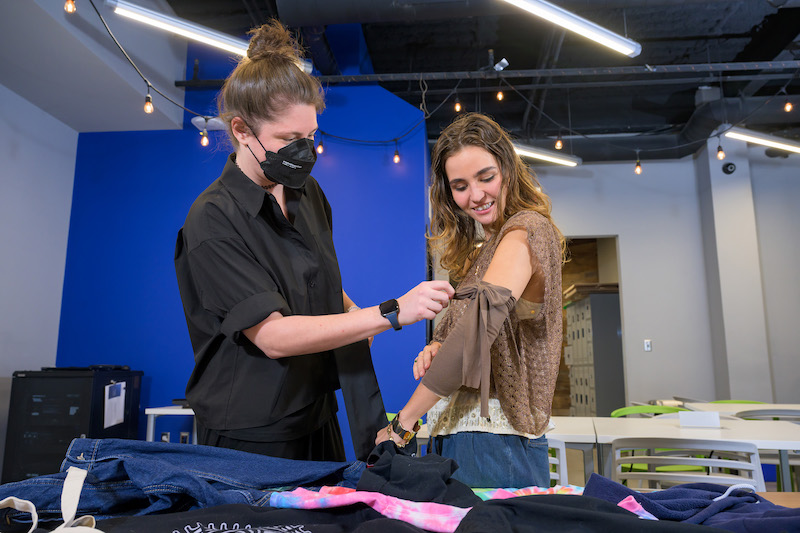


Clothing chronic conditions
Photos by Evan Krape October 08, 2025
UD graduate student Emilie Delaye studies the clothing challenges of women with chronic illness
Emilie Delaye, a University of Delaware master’s student in fashion and apparel studies, has dedicated years to supporting women like herself who struggle with chronic illness and recently focused her research on helping them manage their unique clothing challenges.
Funded as a Graduate Community Engagement Summer Scholar, Delaye spent this summer interviewing women with chronic conditions — such as dysautonomia, endometriosis and infectious diseases — to understand how off-the-rack fashion fails to meet their basic needs. For some, their clothing must fit around medical equipment attached to their bodies; for others, their constellation of symptoms is always evolving and requiring new accommodations.
Delaye lived for the past year with first a port and then a peripherally inserted central catheter in her chest, which were used to treat her neurologic Lyme disease and limited her clothing choices.
“I love to express myself through clothing, [but] I started having to wear plain t-shirts,” she said. “I had to cut holes in my shirt in order to make it work for me. I can't be the only one struggling with this problem.”

Indeed, about 40% of American women have more than one chronic condition.
“There's even a gap within adaptive fashion,” Delaye said. “Women with chronic illness have fluctuating symptoms, so they need a wardrobe that adapts to their everyday life.”
As an undergraduate, Delaye was inspired by another UD entrepreneurship major, Sierra RyanWallick, who has been a vocal advocate for those managing chronic illness. RyanWallick was eager to participate in Delaye’s study.
Thirteen years ago, doctors inserted a catheter in RyanWallick’s upper arm to treat Lyme disease. The flexible tube was a temporary but constant attachment. Today, she experiences temperature dysregulation, painful bloating and tactile sensitivity, which causes irritating discomfort — this last a symptom of her recently diagnosed autism.
Getting dressed every day has been a persistent frustration.
“A lot of clothing wouldn't work,” RyanWallick said. “My needs have changed a lot over the years.”
Sheng Lu, professor and director of graduate studies in the Department of Fashion and Apparel Studies, has served as Delaye’s advisor and mentor. As an economist, he said the research was eye-opening.
“I traditionally just deal with cold numbers,” Lu said. “But I learned so much from our interviewees like Sierra. Their stories remind me why we need to do this project, not to have one more publication, but to leverage knowledge to solve real-world problems. The solutions require a lot of innovation.”
Lu and Delaye are exploring partnerships with large retailers and major brands.
“Collaborating [with large retailers] would allow us to reach a wider sample size, run focus groups and refine the designs based on direct feedback,” Delaye said.

Alternatively, Delaye said that she plans to design “a capsule collection that balances fashion and function. Alongside adaptable everyday wear, I also plan to design specialty items such as PICC [peripherally inserted central catheter] line covers, ostomy bag covers, compression socks and other garments made with specific symptoms and needs in mind.”
Beyond functional needs, Delaye is considering cost and the lifecycle of materials.
“Since adaptable garments are often priced far too high — especially given the financial strain of medical treatment — I see an opportunity to create pieces that are more affordable and accessible,” she said. “I’m considering upcycling existing clothing, modifying garments or using recycled fabrics to design entirely new pieces.”
The results of the study so far reveal simple solutions, such as deeper pockets and looser necklines and waistbands, and that resonate with many women.
“There are some key themes in our findings that hit home for all consumers,” Delaye said. “I really hope that this study allows big retailers and fashion brands to reflect: Do they actually know their consumer?”
Delaye has been intentional about building trust and community, from offering resources to keeping in touch with participants.
“[The interview] was almost therapeutic,” said RyanWallick. “And that was just really impactful, because chronic illness is invisible, and it's also lonely.”
Delaye has been working with instructors with the hope of offering online trauma-informed yoga classes and art to help with emotional healing.
“We have weekly or bi-weekly updates to the community about what's currently going on in the study,” Delaye said. “We want them to see the preliminary results and give us feedback.”
In two months, a social media account about the study gained 1,000 followers and had 70,000 likes.
“The community is not just on Delaware's campus, and it's not just within the interviews that we've conducted. It's global,” Delaye said.
About Graduate Community Engagement Summer Scholars
Community Engagement Summer Scholars is a long-standing summer program that provides highly motivated students the opportunity to immerse themselves in community-based projects. The program is open to all graduate students and is administered by the Community Engagement Initiative, which works to facilitate and strengthen UD’s identity and impact as an engaged research university and community partner throughout the state of Delaware and beyond.
Contact Us
Have a UDaily story idea?
Contact us at ocm@udel.edu
Members of the press
Contact us at mediarelations@udel.edu or visit the Media Relations website

